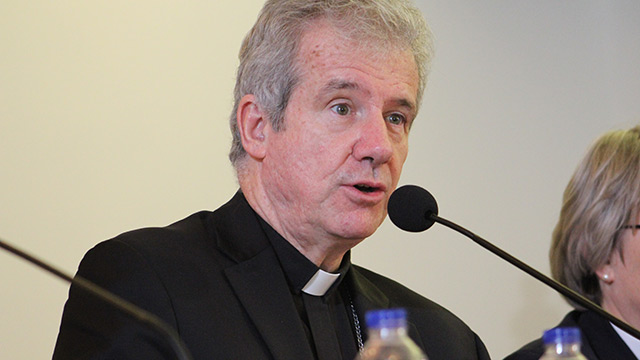Interfaith panel addresses “openness to others”

Montreal
“The best way to overcome our fear of others is to meet them, get to know them, and acknowledge them,” declared Archbishop Christian Lépine, part of an interfaith panel that was held November 17.
"I can assure you that I will convey the message that I heard today," promised city councillor Craig Sauvé to the members of the panel who participated in the morning discussion at the Grand Seminary of Montreal.
The day after Valérie Plante was sworn in as the new mayor of Montreal, five religious leaders discussed secularism, living together in a diverse city like Montreal, and the implications of the new Act on State religious neutrality, passed on October 18.
Aware that there are tensions in Quebec society regarding the place that religious discourse in the public space should occupy, a Jewish leader, two bishops, an aboriginal ethnohistorian and an imam reiterated the importance of dialogue and openness for countering the prejudice and intolerance that many minority groups in Montreal face.
Promoting dialogue
"We can all express different convictions, but each of us has a deeper reality, the one of our own humanity," said Most Rev. Christian Lépine, Roman Catholic Archbishop of Montreal.
In a society made up of multiple identities, "we should not look at what divides us, but rather at what unites us. By encountering others that are different from us, we realize that they, too, are seeking happiness and peace," he added.
According to the archbishop, Montreal must first and foremost remain "a welcoming land, a platform that is open to the world, and definitely not a closed island."
"We must not deny our fears, which are real, but overcome them. The best way to overcome our fear of others is to meet them, get to know them, and acknowledge them," he said.
Jean-Louis Fontaine (Innu) deplored the fact that this openness is slow to manifest itself to the aboriginal communities. "You are not familiar with all of our spiritual beliefs or have little knowledge of them. This gives rise to prejudice, which then often leads to racism."
The former president of the Communauté sépharade unifiée du Québec (United Sephardic Community of Quebec), Dr. David Bensoussan, believes that the primary cause of prejudice towards minority groups, including Jews, is ignorance.
"This ignorance leads to misconceptions that need to be undone," said Imam Mahdi Tirkawi, representing the Muslim Association of Canada. "Today, we make simplistic associations between the acts of splinter groups that represent a minority and those of the overwhelming majority of Muslims," he said.
The panelists insisted that society, like religions, must increase the opportunities for encounter and dialogue among citizens themselves, but also between individuals and civil authorities.
"Through dialogue and sharing what is in our hearts, we come to understand each other better, and move forward," added Dr. Bensoussan, commending the initiative of the Fondation du Grand Séminaire de Montréal, which organized the interfaith gathering. It is hoped that this gathering will become an annual event, "to help Quebec society better understand the diversity of beliefs and the paths for advancing together and to no longer fear other religions."
Secularism and neutrality
"If secularism is the neutrality of a state that will not favour any community, it is good for us all," said Imam Tirkawi. "Each spirituality, each religious tendency can find itself in the same space."
He believes that, under such conditions, secularism "is an opportunity given to each citizen to exercise their civil rights."
For Archbishop Lépine, a distinction must be drawn between the concepts of open and closed secularism. "Open secularism is an excellent thing. Society is viewed as a space where varying convictions can meet," he said.
Closed secularism, however, "decides that certain forms of convictions do not have a place in the public space," the archbishop underlined. "If I am told that if I wear a religious symbol, I must disappear, respect is certainly not being promoted," he insisted, deploring that the Act on State religious neutrality proposes "curious ways" to achieve its objectives for dialogue and openness.
"Turning people into second-class citizens is not a good way,' he said.
Bishop Mary Irwin-Gibson, Anglican Bishop of Montreal, reiterated that she does not like the recently enacted Bill 62. "I have spoken against this Act that I find to be intolerant."
Under this new Act, those giving or receiving public services are required to do so with their face uncovered. The provisions of the Act must also be complied with at the municipal level.
The Anglican Bishop pointed out that the issue of religious clothing is always a sensitive one to address. She recalled that, as a young priest, while walking in Montreal's east end, a man deliberately spat in front of her. "Was it because I was wearing a collar, and he had something against the Church or God? Perhaps he was against the fact that I was a woman," she speculated, still shaken by the gesture.
Imam Mahdi Tirkawi, without referring directly to the issue of banning face-covering, deplored that this Act "puts pressure on certain people in order to deprive them of that which is of value to them, to deprive them of their dignity."
"Secularism must not exclude people," said the young imam.
In an interview, city councillor Craig Sauvé said that he took due note of the thoughts expressed by the Montreal religious leaders. He repeated that the new municipal administration "has promised it would not seek political gain on the backs of cultural, religious or linguistic communities." He acknowledged that diversity is a great richness that is, at times, a source of tension. "Our administration will be present to facilitate dialogue and ease tensions."

Comment
0 Comment
Add new comment